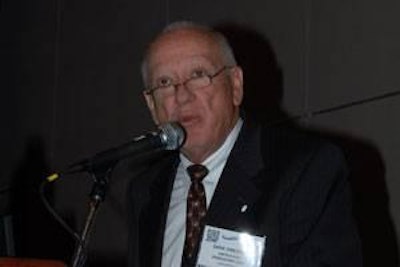
The proposed legislation, H.R. 3798, which would amend the Egg Products Inspection Act, to codify the laying hen welfare agreement between the Humane Society of the United States and the United Egg Producers as the law of the land was introduced into the U.S. House of Representatives on January 23. Gene Gregory, president, United Egg Producers, announced the introduction of legislation to attendees at the United Egg Producers board meeting which was held prior to the International Poultry Expo in Atlanta.
At the time of its introduction, H.R. 3798 had four cosponsors: Kurt Schrader, D-Ore., Jeff Denham, R-Calif., Elton Gallegly, R-Calif., and Sam Farr, D-Calif. The next step for the United Egg Producers, according to Gregory, will be to get a companion bill introduced in the Senate. Gregory said that it will be important for all United Egg Producers members to support the efforts to achieve passage of the legislation. Members will be asked to contact their representatives in the U.S. House and Senate and educate them on the legislation and ask them to sign on as a cosponsor.
Gregory described the efforts of the United Egg Producers membership to get the legislation introduced as somewhat of an uphill struggle. “So far it has been a grass roots effort by the egg industry to get to this point despite all of the opposition,” he said. “Up to this point it has only been the egg industry telling Congress that we want this and need this. The Humane Society of the United States will now unleash its members to lobby Congress in support of the legislation.”
Passage won’t be easy
A number of animal welfare groups and state egg producer associations have come out in support of H.R. 3798. The American Society for the Prevention of Cruelty to Animals, National Consumers League, the Association of California Egg Farmers, Colorado Egg Producers Association, Florida Poultry Association, Michigan Agri-Business Association, Michigan Allied Poultry Industries, North Carolina Egg Association and Ohio Egg Processors Association have all come out in support of the bill.
The problem is that a number of large and influential livestock and agriculture groups have announced opposition to the legislation. Gregory discussed the groups who have lined up in opposition to the bill at the Executive Conference on the Future of the American Egg Industry, which was held during the International Poultry Expo. “Our opposition is the National Cattlemen’s Beef Association, National Pork Producers Council, National Turkey Federation, American Sheep Industry Association, American Farm Bureau Federation, National Milk Producers Federation and the National Farmers Union, but not on the list is the National Chicken Council,” he said.
Gregory was quite animated in talking about his attempts to discuss the legislation with other agriculture groups, most of whom Gregory said declined offers to discuss the situation that egg producers find themselves in. The National Turkey Federation and the National Chicken Council spoke with Gregory, but other agriculture groups did not.
He said that this legislation is not precedent setting, because in his opinion, any legislation affecting an animal agriculture industry could not be passed through Congress without the agreement of that industry, producers and welfare groups would have to be in agreement. He said that H.R. 3798 only affects eggs.
Speaking at the United Egg Producers board meeting, Gregory was steadfast in his support of H.R. 3798. “Despite all the opposition, the board (of the United Egg producers) has given us the direction to get this done, and we will get this done,” Gregory said.
Setting the agenda is crucial
“The United Egg Producers and egg farmers have spent millions of dollars trying to defend the industry,” Gregory said at the Executive Conference on the Future of the American Egg Industry. He said that negotiations with the Humane Society of the United States were undertaken by the United Egg Producers proactively so that the egg industry could set the agenda.
“The egg industry did not cave in to the Humane Society of the United States,” Gregory said. “We set the agenda. For years they had been setting the agenda and we were losing. We set the agenda and said in our first meeting, these are the things we want. A lesson to everyone else in agriculture, a year ago we would have said that you cannot have a discussion with the Humane Society of the United States because it’s either their way or no way, and that is exactly how it will be for you if you let them set the agenda. When you go and say, ‘these are things that we think will improve animal welfare and it helps you do some of the things you want,’ then you set the agenda. We found out that you can have meaningful discussions and negotiations with the Humane Society of the United States.”
Gregory said that the conversion to enriched colony housing will cost the egg industry $4 billion, but he thinks that the additional cost per egg will not be great. “It is my belief that when we reach that ultimate goal of 124 square inches per bird, the cost per dozen eggs will be considerably less than anyone thinks at this time,” he said.



![Don Adams, vice president, sustainability, Keystone Foods, said “In the future, it may be necessary to have a good [corporate social responsibility] program to have a seat at the table.”](https://img.wattagnet.com/files/base/wattglobalmedia/all/image/2015/04/an.1204EIsustainAdams.jpg?auto=format%2Ccompress&fit=crop&h=167&q=70&w=250)













